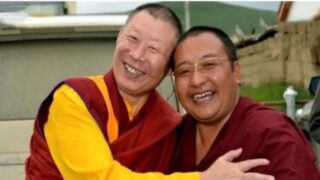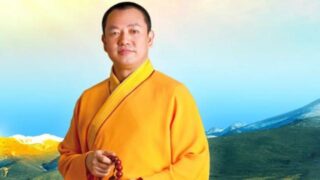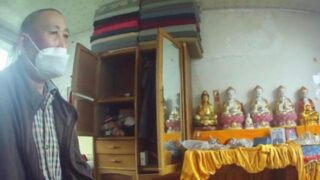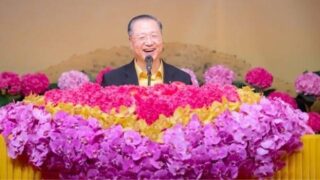Hubei capital’s authorities continue repressions against the religious under the pretext of “cleaning up the city” before the start of Military World Games.
by Cai Congxin
Bitter Winter has already reported on how authorities in Wuhan, the capital of the central province of Hubei, shut down religious venues and “beautify” the city by destroying residents’ homes and businesses ahead of the Military World Summer Games to be held in October. Wuhan is home to quite a large community of Buddhists, and the city government has ordered to close down each temple in the area before the Games, notwithstanding if the places of worship have permits to hold religious activities. The authorities decreed that all Buddhist statues should be removed, temples painted white, and monks and nuns should leave.
Temple razed to the ground because of its bright colors
On the evening of March 29, the area around Xi Temple in Wuhan’s Huangpi district was sealed off, preventing people from approaching, and soon after, an excavator razed to the ground the temple’s main hall.


“The Military World Games is an important event with participants coming from around the world. The hall’s colors were too bright and were not harmonious with those of the surrounding buildings, affecting the city’s appearance. It had to be torn down – this is a national policy,” a local official explained the reason for the demolition.
But a Buddhist in the area told Bitter Winter that the color of the building was not the real reason for the temple’s demolition, and has nothing to do with the city’s image – it is rather part of the government’s campaign to suppress religions. He also revealed that the temple’s main hall was built in 2017 at the cost of more than two million RMB (around $ 280,000), the money donated by a single benefactor.
The incident provoked a great deal of discussion among residents who could not understand as to why the government had demolished such a beautiful temple. Some recounted seeing a monk, sitting on the ground outside the temple right after the demolition, who was sighing in sorrow as he looked at the ruins.
The crackdown against the temple did not end there. On the evening of April 11, the Huangpi district government dispatched more than 40 personnel to the temple, seeking to demolish another hall, as well as the meditation room and the dining room used by the monks. Regardless of repeated pleas by believers, the authorities remained unmoved and ordered everyone to leave.


At 3 a.m. on April 12, before believers had a chance to clear everything out of the dining room, several of the temple’s buildings were razed to the ground by an excavator. “They acted like bandits, demolishing the temple through the night,” an elderly believer said with sadness and anger.
Temples’ walls painted white
Qingyun Temple in Huangpi district became one more victim to the government’s “beautification” project. Painted in yellow and red – the iconic colors of Buddhist religious venues – the temple was an eyesore to the district government, and they ordered the person in charge of the temple on March 24 to repaint it white. Also, the temple’s entrance was to be blocked, monks removed from the temple, and burning of incense and worshipping Buddha prohibited from then on. Officials reiterated that this is a nationwide campaign and threatened to tear down the temple if the person-in-charge disobeys.


Afraid of retaliation by the government, the person in charge did as told: he painted the temple’s walls white and sealed off the entrance with bricks. The name of the temple and Buddhist sayings inside the temple were painted over. From afar, the building no longer bears any characteristics of a temple.




In mid-June, Dekang Temple, another Buddhist place of worship in Huangpi district, was ordered to have all its religious statues removed from inside the temple and seal up its gate.


The monks in the temple were prohibited from wearing traditional robes and were ordered to grow their hair. Shaving of the head is an old Buddhist practice, part of the code of conduct for monks and nuns, signifying that they have accepted an ascetic lifestyle and given up all worldly possessions. “They’re forcing us down a dead-end road!” one monk said with a sense of utter helplessness.
Two more Buddhist venues in Wuhan – Shuikou Temple and Yangshan Temple – have been suppressed to varying degrees. Shuikou Temple’s entrance was sealed off, and two Buddhists that had valid certificates who lived there were driven out of the temple. Yangshan Temple’s perimeter walls and the dining room inside were painted white, and the temple was renamed “The Council Hall of Rural Sages” – a civic organization for local elites, current and retired officials, that meets regularly to discuss the development of the area they live in.













